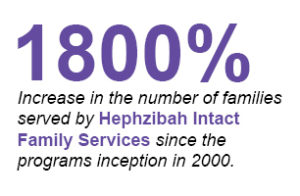Deborah needed help. She was struggling to free herself from an abusive marriage and worried about the impact of her husband’s behavior on their oldest daughter, who was becoming increasingly withdrawn.
Jean was so immobilized by depression that she could barely get off of the couch—and her kids were running wild.
Derek lost his job as a dishwasher when the restaurant that employed him shut down during the pandemic. He was lashing out at his wife and clashing constantly with his 11-year-old son.
Each one of these families was in danger of fracturing last year from pressures such as poverty, unemployment, mental illness, domestic violence, addiction and COVID-related hardships. They are just three of the nearly 200 families served by Hephzibah’s Intact Family Services program in 2020–21.
“We do whatever it takes to stabilize and strengthen these families so that they can raise their children in a positive, safe and nurturing environment,” says Family Based Services Director Julie Dvorsky, LCSW. “When a family is referred to us, we conduct an in-home assessment to identify the stressors that are destabilizing the family. Then we develop a support and intervention plan.”
 The Intact Family Services team addresses the family’s immediate needs first with direct services such as emergency rental assistance, utility payments to keep the heat and lights on, Ventra cards to get parents where they need to go and grocery store gift cards to put food on the table. Then the deeper work begins with services such as substance-abuse assessments and referrals, domestic-violence intervention programs, parenting classes and family therapy sessions to reduce the likelihood of child abuse and neglect.
The Intact Family Services team addresses the family’s immediate needs first with direct services such as emergency rental assistance, utility payments to keep the heat and lights on, Ventra cards to get parents where they need to go and grocery store gift cards to put food on the table. Then the deeper work begins with services such as substance-abuse assessments and referrals, domestic-violence intervention programs, parenting classes and family therapy sessions to reduce the likelihood of child abuse and neglect.
The Intact Family Services team has been keeping families “Hephzibah Strong” since 2000, when the program was launched with a caseload of 10 families. Last year, we served more intact families than ever before: a total of 191 families and 457 children over a 12-month period.
This exponential growth reflects an increasing emphasis on prevention in the child welfare field, which culminated in the 2018 passing of the federal Family First Prevention Services Act. The Family First legislation increased funding at the state level for programs designed to strengthen and support families, so that children can be kept safely at home and out of foster care.
“If at all possible, children should be able to grow up in their families of origin,” Dvorsky emphasizes. “For this reason, we have made it a strategic priority to serve at the forefront of prevention efforts in Illinois. The Family First Prevention Services Act presented new avenues for prevention funding, so we seized this opportunity by doubling our Intact Family Services program capacity, providing a broader array of evidence-based prevention programs and adding a second Intact Family Services team to ensure that every family referred to us has the support and services it needs to thrive.”
One of these services is Hephzibah’s newly launched Positive Parenting Program, which could be loosely defined as a “course in resilience.”
Triple P—as it is often called—teaches parents simple, practical ways to build strong, healthy family relationships and confidently manage their children’s behaviors.
Because the training takes place in the home, rather than in a classroom, Hephzibah’s Triple P facilitators get a firsthand view of the family’s relationship dynamics and the specific behavioral issues that parents hope to address.
According to Dvorsky—and the 21 families that got the help they needed—Triple P helped defuse some potentially explosive situations and lay the foundation for healthier dynamics going forward.
One hundred percent of the parents who received Triple P training reported that most or all of their children’s needs had been met, 92 percent felt that the program had helped them deal more effectively with family problems and 92 percent reported an improvement in their children’s behaviors.
“Our parenting coach was very kind and professional,” said one grateful parent. “We loved the program and wish we could do it again!”
This piece was originally published in our 2020-2021 Annual Report.
“A healthy family is sacred territory.”
— Proverb


